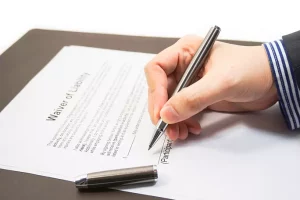
If you have ever visited a trampoline park, a theme park, a sporting event, or a leisure event, you almost certainly signed a disclaimer or had one clearly stated in your ticket purchase. Businesses are increasingly relying on liability releases to shield themselves from accountability for possible harm caused by their equipment or behavior.
If you are injured after signing a waiver, however, you may still be eligible for compensation. If you have been hurt after signing a waiver, here is what you should do.
What exactly is a waiver?
A waiver is the voluntary surrender or relinquishment of a recognized right or privilege. When you sign a waiver, you are freely and deliberately relinquishing your right to hold the other party accountable for any injuries. A waiver can be referred to by a variety of terms, including but not limited to:
- Waiver of rights
- Waiver of liability
- Release of liability
- Pre-injury release
- Assumption of risk
- Indemnity agreement
- Agreement to hold harmless
- Assumption agreement
- Exculpatory agreement
Let us take Walt Disney World as an illustration of what a waiver may look like in practice. Three banners are shown at the top of their website. The first banner denotes that their face mask requirement has changed. The second section contains some park disclaimers. The third displays a COVID-19 pandemic warning, along with a link to further information.
When you click the third banner for further information, you will be sent to their Coronavirus plan, which includes a warning that acts as a waiver. The following is part of the waiver: Any public venue where people are present has an inherent danger of COVID-19 exposure. COVID-19 is a highly infectious virus that may cause serious sickness and even death. Senior individuals and guests with underlying medical concerns, according to the Centers for Disease Control and Prevention, are particularly vulnerable.
You freely undertake any risks associated with COVID-19 exposure by visiting Walt Disney World Resort.
This waiver informs visitors that by purchasing a Disney World ticket, they are relinquishing their right to sue Disney if they are exposed to COVID-19 during their stay. The liability release discusses the hazards and places COVID-19 responsibility on the guest.
When you sign a waiver, you agree to assume the risk associated with the activity. Going to the gym, visiting a theme park, skydiving, or doing anything risky might be examples of this activity. You promise not to sue those in charge if you are hurt during the activity, whatever that activity may be, by signing a waiver. But what happens if you get hurt after signing the waiver?
Waivers and lawsuits
Even though you signed a waiver, you can still launch a lawsuit in some scenarios, especially if the release of liability is not enforceable. In order for a waiver to be enforceable, it must adhere to the following guidelines:
- The waiver must be written down
- In addressing the dangers connected with an action, the waiver must be properly stated and explicit
- The waiver must be visible and not deceptive
- The waiver must be signed freely by an adult
- The waiver does not cover excessive negligence or recklessness on the part of the firm
In addition to those five criteria, waivers may be unenforceable in other circumstances, such as if a harm occurs as a result of an action not covered by the waiver. As an example, consider scuba diving. When you go scuba diving, you sign a release agreeing not to hold the business liable for any injuries sustained while diving. Assume, however, that an accident happens during the boat voyage to the diving site. In that situation, you may be able to hold the corporation liable since the waiver did not cover the dangers associated with the boat ride.
If a waiver contradicts public policy, it may be unenforceable. If the waiver’s requirements may risk public safety, it would be declared unlawful and unenforceable. Waivers are unenforceable when they pertain to:
- The construction or upkeep of a structure
- Landlords using leasing arrangements to shield themselves from liability for tenant accidents or injuries
- Experts in medicine
Consult a lawyer
If you have been hurt as a result of signing a waiver, contacting an attorney is the best approach to guarantee that you receive the compensation you deserve. It can be difficult to determine if a waiver is enforceable, and an experienced personal injury attorney can assist you understand your options. We want to help you understand your rights. Contact Law Offices of Fernando D. Vargas at 909-982-0707 for a free legal consultation today.




